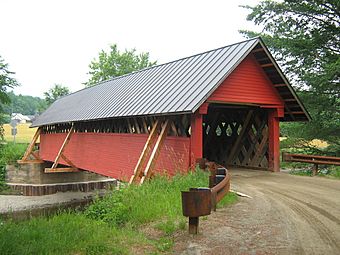River Road Covered Bridge facts for kids
Quick facts for kids |
|
|
River Road Covered Bridge
|
|
 |
|
| Location | Veilleux Rd., Troy, Vermont |
|---|---|
| Area | 1 acre (0.40 ha) |
| Architectural style | Town lattice truss |
| NRHP reference No. | 74000249 |
| Added to NRHP | November 19, 1974 |
The River Road Covered Bridge was a special old bridge in Troy, Vermont. It used to carry Veilleux Road over the Missisquoi River. This bridge was built in 1910. It was the only covered bridge left in Troy from a long time ago. Sadly, it burned down on February 6, 2021. The bridge was known for its unique design. It was even listed on the National Register of Historic Places in 1974.
Contents
What the Bridge Looked Like
The River Road Covered Bridge was in a quiet, country part of central Troy. It stretched across the Missisquoi River. The bridge rested on strong supports made of stone and concrete. It was a single-span bridge. This means it crossed the river in one big jump.
Bridge Size and Materials
The bridge was about 94 feet (29 m) long. It was also about 14.5 feet (4.4 m) wide. The part where cars drove was 12 feet (3.7 m) wide. This meant only one car could cross at a time. A metal roof covered the bridge. Its outside walls were made of vertical wooden boards. These boards also covered the inside of the openings. The siding did not go all the way to the roof. This left an open space at the top.
Unique Design Features
This bridge used a special building style. It was called a "Town lattice truss." Most bridges of this type have four main wooden beams. But the River Road Bridge had only three. Also, its wooden parts were held together with single pegs. Most other bridges of this type used two pegs. These differences made it very unique.
History of the River Road Bridge
The River Road Covered Bridge was built in 1910. We do not know who built it. It was the only covered bridge in Troy. Besides its unusual truss design, the bridge had other special features. It had a very wide roof. It also had extra wooden supports on the outside. These supports are not usually found on covered bridges.



